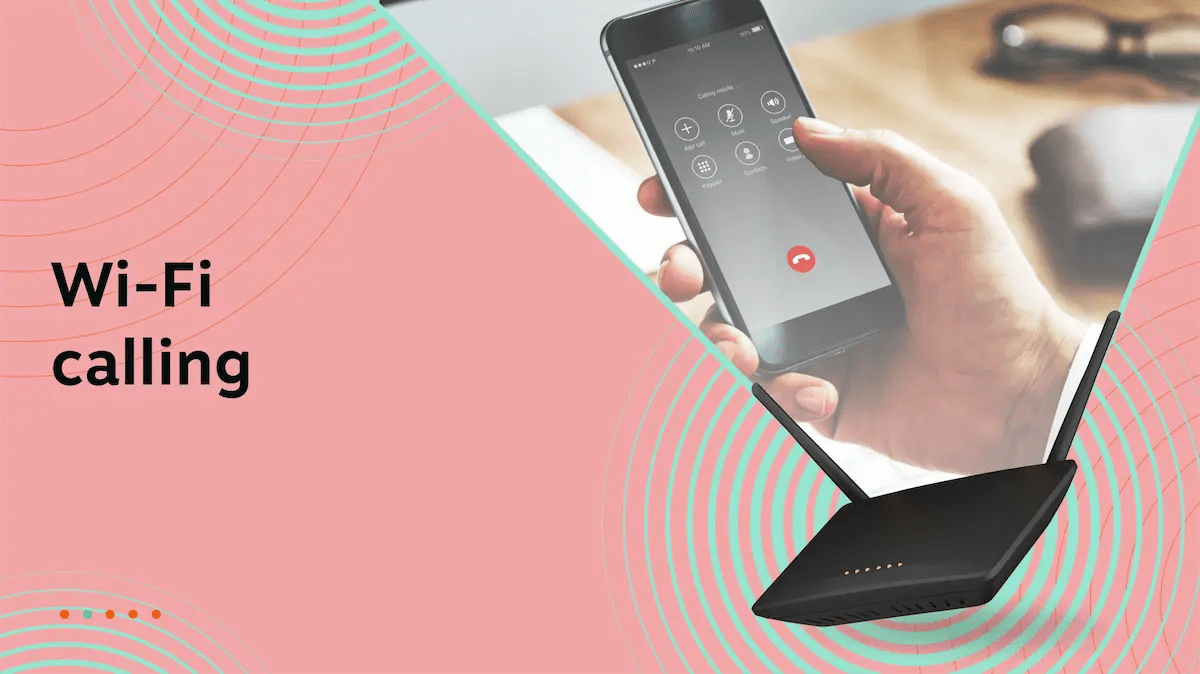Debating whether to switch from landline phones to VoIP? You’ll likely have questions about how VoIP technology works and how it compares to traditional phone service, especially in terms of reliability.
In this article, we’ll cover everything you need to know about VoIP reliability for a smooth and secure transition to a cloud phone system.
What Is VoIP & How Does It Work?
Voice over Internet Protocol (VoIP) is a business phone system that places and receives calls via an internet connection. Unlike a landline phone system with on-premises equipment and tangled copper wires, VoIP connects to a hosted PBX (private branch exchange) located in the cloud.
VoIP converts voice into digital signals that are sent over a high-speed internet connection to the VoIP service provider, which then connects the call to other carriers on the public switched telephone network (PSTN). Calls can originate from desk phones, conference phones, computers, or mobile devices.
VoIP technology uses Session Initiation Protocol (SIP), a set of open standards for real-time communication also employed by apps like Skype and WhatsApp for voice calls. The only thing VoIP needs is a high-speed internet service, which currently 94% of Americans can access, according to Statista.

Is VoIP Reliable?
The short answer is Yes.
The reliability of VoIP has greatly improved in recent years, thanks to three key factors:
1. Advancements in internet technology
The meteoric rise of high-speed broadband internet enabled reliable VoIP. Today’s cable, fiber, and even 5G Wi-fi internet connections provide far more consistent bandwidth and lower latency. This allows for crystal clear and HD VoIP calls without drops or network jitter.
2. Cloud-based infrastructure
Rather than being confined to an on-premise system, Voice over IP providers leverage redundant, geographically diverse data centers connected by tier 1 fiber networks. If an outage impacts one data center, calls are automatically rerouted to other locations to maintain 99.999% uptime guarantees.

3. VoIP vs. landlines
While landline service was once considered the “gold standard” for reliability, VoIP has closed the gap. In fact, VoIP phone systems can prove to be more reliable than traditional lines in cases of localized outages or service interruptions. VoIP calls can simply be rerouted over the internet and receive calls on any device.
The reliability of VoIP has caught up and even surpassed traditional landline telephones based on a few key advantages:
- Uptime & redundancy: Top VoIP solutions have redundant data centers and can automatically reroute calls in case of downtime or other issues. Landlines rely on physical infrastructure that’s difficult to bypass during outages.
- Disaster recovery: VoIP enables call forwarding to employee devices during emergencies. With landlines, the phone lines at the affected location are down completely.
- Costs: VoIP phone systems typically have much lower costs compared to landline telephone service. No expensive hardware installations or maintenance costs are required. Most VoIP providers offer flat monthly rates or per-user pricing, which is cost-effective, especially for small businesses or ones with multiple users or locations. Landline costs can quickly add up between equipment, service fees, and per-minute calling rates.
- Call quality: Modern VoIP phone service uses HD voice codecs and noise cancellation for superior call clarity over landlines. Issues like static, echoing, and dropouts are minimal.
- International calls: Long-distance calling is much more affordable with VoIP since it routes calls over the internet rather than traditional phone lines. Landlines often have extremely high per-minute rates for international calling.
- Flexibility: VoIP is not tied to a physical location, enabling mobile and remote work possibilities beyond traditional phone limitations.
- Security: VoIP providers use secure encryption protocols and meet stringent data security certifications like HIPAA and PCI-DSS. Landlines can potentially be tapped or compromised more easily.

While both VoIP and landlines have advantages, VoIP has evolved to meet and exceed modern business needs for reliability, mobility, and cost-effectiveness.
The key is choosing a reputable, enterprise-grade VoIP provider and a trusted unified communications solution that offers advanced features beyond just calling capabilities.
Factors Affecting VoIP Reliability
VoIP has transformed communication, but ensuring smooth sailing with it requires navigating some potential challenges.
Let’s dive into the key factors impacting VoIP reliability, the challenges they present, and how to overcome them.
1. Network quality & bandwidth
Imagine a highway packed with cars. That’s what a congested network looks like for VoIP calls. Insufficient bandwidth or network overload can lead to choppy audio (packet loss), jittery calls, and frustrating dropped connections.
The Fix: Quality of Service (QoS) to the rescue. This prioritizes VoIP traffic over other data, ensuring your calls get the fast lane. Additionally, make sure your network has enough bandwidth to handle the number of simultaneous VoIP calls you expect.

2. Power outages & backup solutions
Power outages and internet disruptions can silence your VoIP system faster than you can say “hello?” To avoid this, be prepared.
The Fix: Implement redundant power supplies, uninterruptible power sources (UPS), and backup internet connections (cellular data or a secondary ISP) to ensure your VoIP service stays up and running during outages.
3. Security & encryption
VoIP conversations can be vulnerable to eavesdropping or tampering, just like any online communication. This can be a privacy and security concern.
The Fix: Put a shield around your calls with end-to-end encryption using secure protocols like TLS or SRTP. This scrambles the data, making it unintelligible to anyone trying to listen in.
4. Interoperability & standardization
Sometimes VoIP systems from different vendors aren’t compatible with your infrastructure. This can lead to connection issues and reduced reliability.
The Fix: Stick to industry standards and protocols like SIP, RTP, and SRTP. This ensures your VoIP system can communicate smoothly with others, regardless of the brand. Additionally, test everything thoroughly before deployment to identify and fix any compatibility problems.
5. Monitoring & troubleshooting
With VoIP, troubleshooting issues can feel daunting because many components are involved (phones, gateways, servers, networks).
The Fix: Use comprehensive monitoring and troubleshooting tools to catch problems before they disrupt your calls. Train your IT team on VoIP troubleshooting techniques and establish clear procedures for escalating and resolving issues.

6. VoIP provider choice
The VoIP provider you choose significantly impacts reliability and quality. Some providers might have subpar infrastructure, limited support, or inadequate QoS measures, leading to frequent outages or poor call quality.
The Fix: Do your research. Evaluate potential VoIP providers and phone companies based on network infrastructure, service level agreements (SLAs), customer support, redundancy measures, and reputation.
Here are the key factors to consider to ensure reliability and performance:
- Uptime guarantee of 99.99% or higher
- 24/7 customer support via phone, email, and chat
- Tier 1 network and geographically distributed data centers for failover
- Robust security measures and third-party certifications (HIPAA, PCI, SOC 2)
- Comprehensive features (call waiting, voicemail, caller ID, call routing, recording, forwarding, video conferencing, auto attendants), smartphone apps, and third-party integrations
Get quotes from a top-rated VoIP provider to compare service plans and pricing. Check reviews on third-party sites like Trustpilot to verify the provider’s track record of reliability and customer satisfaction
Address these factors and implement the suggested solutions to make your VoIP service even more reliable, delivering high-quality voice communication and minimizing disruptions. Go forth and communicate confidently, knowing your VoIP system is built for smooth sailing.
Moving To the Cloud Is Easier Than You Think

Don’t let unreliable phone calls hold your business back.
Cloud-based VoIP offers a robust infrastructure designed for maximum uptime and crystal-clear call quality. This translates to fewer dropped calls, smoother communication, and a more professional experience for everyone you connect with.
Take control of your business communications – Nextiva can help you make the switch to the cloud with a seamless migration process and ongoing support for small businesses and enterprises alike. Visit our website for a free consultation and discover the power of reliable VoIP.
Experience the reliability and clarity of Nextiva VoIP.
Get your questions answered and explore how Nextiva can benefit your business.
VoIP FAQs
You need at least 100 kbps upload and download speeds per line. We recommend running a VoIP speed test to check your bandwidth before switching.
Yes, you can port your current business phone numbers to a VoIP system. The process typically takes 1-2 weeks, depending on your VoIP provider.
You can use IP desk phones, conference phones, or your computer and mobile phone with a softphone app.
VoIP services provide E911 service, connecting your address to local emergency services. But it may be limited during internet or power outages. Consider keeping one landline for emergency use.
Review your current contract and see what your termination fees are and when your contract ends.
Contact potential VoIP providers: and ask them directly if they offer contract buyouts and what their policy is.

















 VoIP
VoIP 








